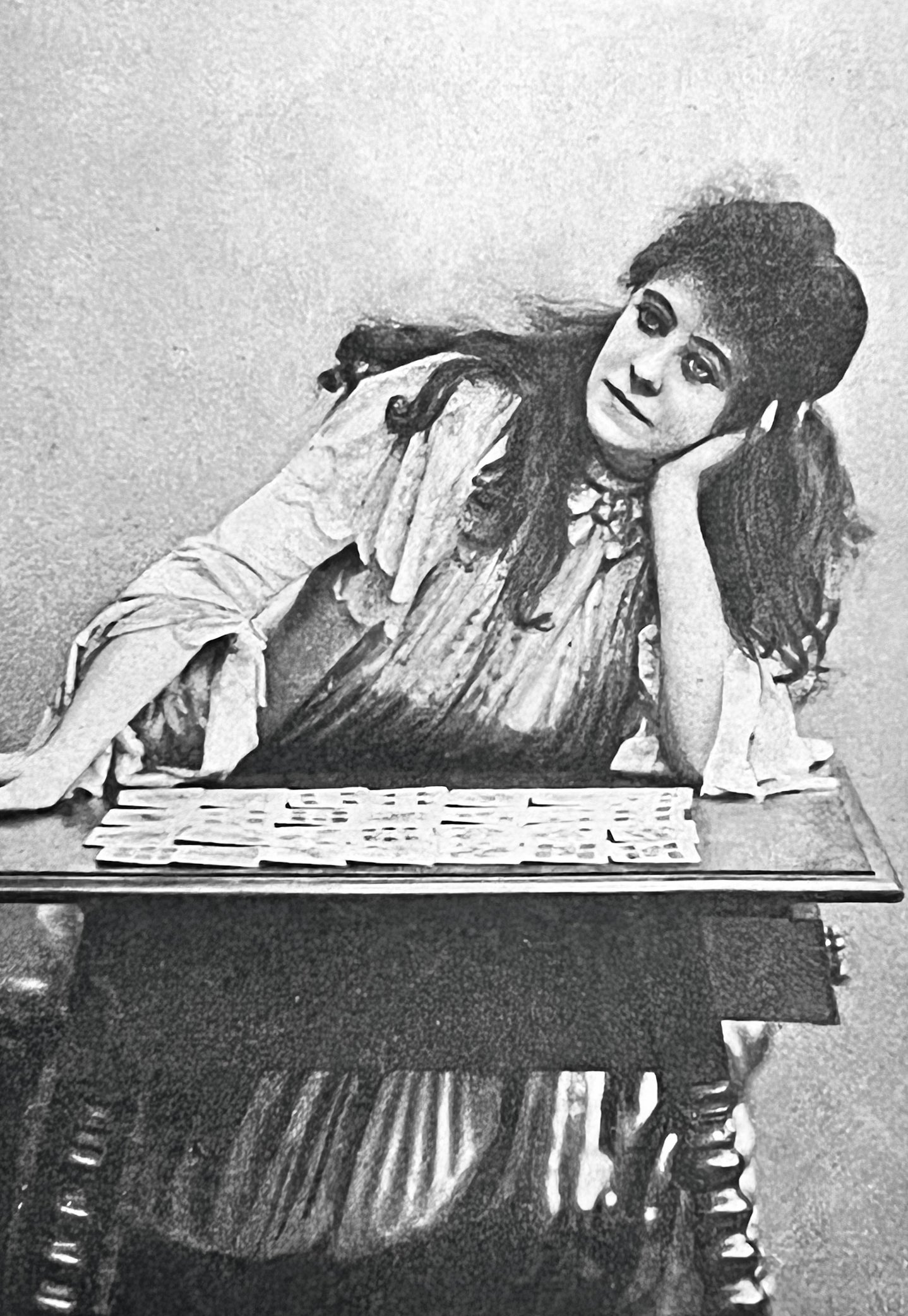
Ask the cards a question,” urges Annie Ridout.
I peer into the Zoom window at the palm-sized deck in her hand and feel just a little bit foolish. Nevertheless, I take a breath and ask what I really came here to ask. It’s a big question, one that could change the entire direction of my next decade.
Annie draws a card and holds it up – the Four of Wands. She reads the caption on it. “Success. You have reached a period of stability after all your hard work. This may also denote a time of repose or recovery after certain challenges and hardships have finally passed…”
Despite having zero attachment to tarot as a concept, I feel a prick of emotion. I’ve been dancing around a point during an hour of talking through my personal goals and frustrations, and the card seems to make it simple for me. It’s so dead-on that I repeat one of the words on the card absentmindedly as soon as she says it. “Peace”. Annie is a life coach and career guide who reckons magic is the key to success. Am I really just about to make a major life decision based on the card she’s turned over?
When Annie was a teen, she found a spell book in a dusty alternative shop in Brighton. Giddy with an early crush, she bought it and cast a spell on the object of her affection. To her delight, he suddenly took an interest in her. At university, she was agonising over whether to stay or leave a course she felt was wrong for her, when her mother pulled out a deck of oracle cards. “Ask the cards,” she said sagely. She can’t remember the exact card drawn, but the message seemed clear: get the heck out of there.
“What I really read was my own subconscious mind, which had already checked out,” she reasons now. “But the card prompted me. It helped me to access my deeper thoughts.”
Magic is not a new fad in Annie’s life. It’s always been there, from her family believing they’d been visited by dead loved ones if they smelled a certain scent, to manifesting romantic relationships. But it’s only in the past couple of years that she became sure that an active spiritual life was the key to a better career, personal life and sense of purpose.
Annie has branded this everyday use of magic – which encompasses carrying crystals, reciting mantras, and asking tarot cards and deities for guidance – in career planning “spiritual intelligence”, or “SQ”. She believes that improving our SQ can directly improve our work/life balance, and she’s writing a book to that effect, as well as running life coaching sessions on how to do it.
The best thing about spirituality is that you don’t need to connect with other people to have it
Two days earlier, I’d ripped open a parcel to find some gemstones, each the size of a grape, plus a little note from Annie telling me they represented love (rose quartz), strength (green aventurine) and mental clarity (clear quartz). It’s generous, but there was something a little earnest, a little teenage-girlish, about it for me. I left them on the dining table and dived back into my work week.
As I was sitting down to our video call that soporific Friday afternoon, I was feeling unprepared. Beaming luminously from the screen, Annie tells me she has lit a candle, rung a Tibetan singing bowl and set an intention for our meeting. I nod brightly, aware that I haven’t so much as made time to boil the kettle.
She tells me she first started incorporating spells and objects into her workday after launching a business with her husband. With three children to look after, growing the company became an all-consuming mission.
“At first it was a form of meditation, I suppose,” she tells me. “Every morning I’d open the loft window above my desk and speak to Vester, goddess of home, hearth and harmony, asking her to bring me prosperity.” She goes one further: “I’d imagine this feminine figure with her arms outstretched, pushing this energy towards me.” She also put a plea out to Zeus, who she’d read could help mere mortals achieve success.
“I would have been really embarrassed if someone had walked in and seen me,” she admits. “But after a while I realised it genuinely helped me. Not just to focus, but to really believe and hope that I would become more successful and win more business and clients.”
And she did. As her family business grew and all things “woo-woo” became more visible in mainstream culture, Annie decided her love of a magic moment could prove useful for other entrepreneurs. And folks like me, dissatisfied in a life rut I’m not sure how to climb out of.
Alternative and superstitious lifestyle practices, from deciphering your personality with an astrological natal chart, to carrying meaning-infused crystals, are undeniably on the rise. Witchy Instagrammers such as Harmony Nice (bio: “Mother Nature’s bitch”) wax magical to audiences of 329,000; the astrology app Co-Star has had more than 20 million downloads, and is used by a quarter of all women aged 18–25 in the US. One 2019 LA Times headline went as far as to suggest that millennials were replacing religion with gemstones and astrology.
“Astrology has really risen in popularity because people want a symbol system that’s not sexist, racist, homophobic, that helps them connect to each other across all demographics,” psychological astrologer Dr Jennifer Freed (Instagram followers: 36,000) told Refinery29 last year.
But Annie disagrees that SQ is about fostering a sense of community in a faithless world. “I was talking to the entrepreneur Sharmadean Reid about this the other day. She said she grew up with formal religion, but hadn’t realised until adulthood that faith and religion were separate – that she could have faith without religion,” she says. “The best thing about spirituality is that you don’t need to connect with other people to have it. You can find the beliefs, rituals and practices that work for you.”

Halfway into our session, Annie asks me to visualise the sort of life I want – day to day, week to week. This isn’t purely about work, she explains: it could be a matter of flexibility, factoring in creative pursuits, taking time outside, framing each day with a goal or intention.
So far, so normal, right? In fact, somewhat anticlimactically, there’s nothing weird or kooky about our chat. In fact, much of it feels like common sense mixed with some five-year-planning, pepped up with a bit of magical thinking. She talks a lot about being “open to” things; she senses my level of cynicism and works with me rather than preaching at me.
She typically coaches women – usually creatives, often starting their own businesses – who delight in the tarot cards, personal shrines and daily mantras that she says focuses the mind on a better way of living. There’s a Goop-iness about Annie, a sort of infectious glow that you feel could be yours if you just buy the right book or download the right podcast – but it’s clear she genuinely wants to help.
She talks me through setting up a personal shrine, somewhere I can come back to and recentre myself, check in with my goals. She tells me she likes to stay open to receiving messages from the universe: she once read that seeing a white feather is a signal of good luck, for example, and sees them everywhere now. She looks out for them with her small daughter, each sighting providing a little boost. It seems “SQ” is less about demanding that people believe in gods, spells and rituals, and more about infusing the mundane with a little witchy fun.
“Thousands of years ago, we’d have all believed that there was this higher power deciding our destiny,” she shrugs. “We know at this point that we need to be healthy in body and mind, but this feels like the third element – reaching out to something beyond us.”
At first, her SQ theory was solely about career success. But as the idea has evolved, it’s become just as much about finding joy in and emotional connection to your work life. “We’ve learnt that work and home are so entwined. It’s not just about money and promotions – it’s about looking at your life as a whole, creating better balance,” she says.
Gratitude has become a bit of a cheesy concept, but it’s really powerful
I ask her about charging £300 for a one-hour coaching session. Is there a danger that SQ – particularly the manifestation, vision-boarding aspect of it – is no better than the toxic-girlboss spiel about everyone having the same 24 hours in a day? Is there a danger of saying: if you’re not successful, you just don’t want it enough? (Not to mention purchasing happiness in a cost-of-living crisis.)
She sits with the thought briefly, but kindly insists it’s a different thing. Offering practical tools to those who feel lost, unmoored or helpless on their wider journey is not the same as the “Get your f**ing ass up and work” school of Kardashian. It’s as much mindfulness and gratitude, she says, as planning and measuring.
“Gratitude has become a bit of a cheesy concept, but it’s really powerful. Just spending a moment thinking about what you do have, what is going well, can balance you. And surely any practice that can help you feel calmer, a bit more positive, is worth trying?”
After our session, Annie emails me a photo of the Four of Wands, and I sit reading it over and over again. She tells me she’s saying a certain prayer for my success and fulfilment, and writes it out for me in case I want to recite it.
The following week, I make my big change. Do the cards know what’s best for me? Or is it me, simply needing validation from a piece of paper? Either way, maybe there’s something to being open to things.
Annie Ridout’s book ‘Raise Your SQ: How to Use the Magic of Spiritual Intelligence to Unlock More Joy and Success’ is out in May



.png?w=600)



